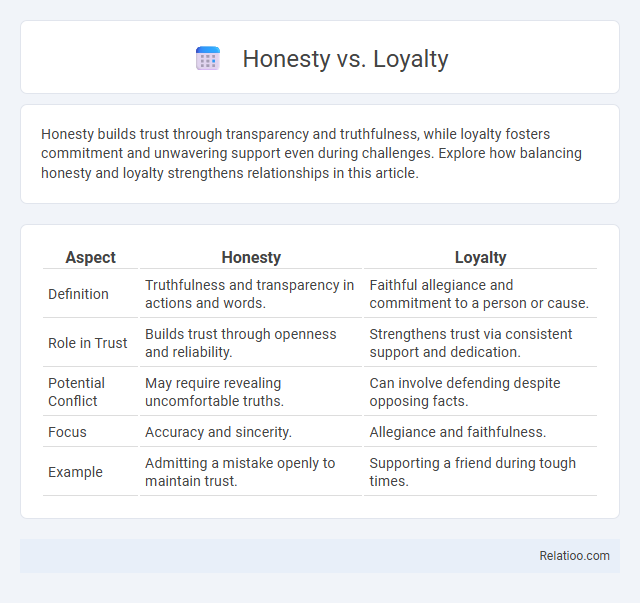Honesty builds trust through transparency and truthfulness, while loyalty fosters commitment and unwavering support even during challenges. Explore how balancing honesty and loyalty strengthens relationships in this article.
Table of Comparison
| Aspect | Honesty | Loyalty |
|---|---|---|
| Definition | Truthfulness and transparency in actions and words. | Faithful allegiance and commitment to a person or cause. |
| Role in Trust | Builds trust through openness and reliability. | Strengthens trust via consistent support and dedication. |
| Potential Conflict | May require revealing uncomfortable truths. | Can involve defending despite opposing facts. |
| Focus | Accuracy and sincerity. | Allegiance and faithfulness. |
| Example | Admitting a mistake openly to maintain trust. | Supporting a friend during tough times. |
Understanding Honesty and Loyalty
Honesty involves consistently telling the truth and being transparent, forming the foundation of trust in relationships. Loyalty emphasizes unwavering support and faithfulness to individuals or groups, often requiring prioritizing their interests. Understanding honesty and loyalty requires recognizing that honesty fosters trust through truthfulness, while loyalty builds commitment through allegiance, and balancing both is essential for meaningful connections.
The Core Differences Between Honesty and Loyalty
Honesty involves being truthful and transparent, even when the truth may be uncomfortable, while loyalty centers on unwavering support and allegiance to a person or cause, sometimes regardless of the facts. The core difference lies in honesty prioritizing integrity and truth, whereas loyalty prioritizes allegiance and trustworthiness, which can occasionally conflict. Understanding these distinctions helps you navigate relationships with clarity, balancing openness with commitment.
Historical Perspectives on Honesty vs Loyalty
Throughout history, honesty and loyalty have often been viewed as competing virtues shaping personal and societal relationships. Ancient philosophers like Confucius emphasized loyalty to family and state but also underscored the importance of truthfulness in maintaining social harmony. In Western philosophical traditions, figures such as Kant prioritized honesty as a categorical imperative, even when loyalty to individuals or groups might demand concealment or deceit.
The Role of Honesty in Relationships
Honesty serves as the foundation for trust and transparency in relationships, enabling open communication and emotional intimacy between partners. While loyalty emphasizes commitment and support, honesty ensures that these bonds are genuine and based on truth rather than blind allegiance. Prioritizing honesty helps prevent misunderstandings, strengthens accountability, and fosters a healthy, enduring connection.
Loyalty: Foundations and Boundaries
Loyalty serves as the foundational trust anchor in relationships, balancing unwavering support with ethical boundaries to prevent blind allegiance. It requires discernment to maintain integrity when loyalty conflicts with honesty, ensuring commitments do not foster deception or harm. Establishing clear boundaries helps loyalty enhance social cohesion while preserving moral accountability and transparency.
When Honesty Conflicts with Loyalty
When honesty conflicts with loyalty, individuals often face ethical dilemmas requiring a balance between truthfulness and allegiance. Prioritizing honesty promotes transparency and trust, but loyalty may demand discretion to protect relationships or organizational interests. Navigating this tension demands careful judgment to maintain integrity while respecting commitments.
Honesty vs Loyalty in the Workplace
Honesty in the workplace fosters transparent communication, builds trust among team members, and promotes ethical decision-making, while loyalty emphasizes commitment to colleagues and the organization, sometimes encouraging discretion or protection over strict truth-telling. Balancing honesty and loyalty requires nuanced judgment, as employees must weigh the benefits of candid feedback against maintaining harmonious relationships and organizational cohesion. Organizations that cultivate environments where honesty is valued alongside loyalty tend to experience stronger employee engagement and more resilient corporate cultures.
Cultural Views on Honesty and Loyalty
Cultural views on honesty and loyalty vary significantly, with some societies prioritizing loyalty to family or group over personal honesty to maintain harmony and social cohesion. In Western cultures, honesty is often regarded as a fundamental moral value, emphasizing transparency and individual truthfulness. Conversely, many collectivist cultures may place greater importance on loyalty, sometimes accepting bending the truth to protect relationships or group interests.
Finding the Balance Between Honesty and Loyalty
Navigating the delicate balance between honesty and loyalty requires recognizing that your commitment to truthfulness should not undermine your allegiance to others, nor should loyalty compromise your integrity. Cultivating transparent communication strengthens relationships while ensuring that honesty is exercised with empathy and discretion. Prioritizing this balance fosters trust, resilience, and mutual respect in both personal and professional interactions.
Choosing Sides: Honesty or Loyalty?
Choosing between honesty and loyalty involves weighing truthfulness against allegiance, where honesty ensures transparency and trust, while loyalty sustains relationships and support. Your decision hinges on the context--prioritizing honesty promotes integrity and long-term respect, whereas loyalty may demand discretion and protection of others. Striking a balance often requires evaluating the consequences of revealing the truth versus maintaining allegiance.

Infographic: Honesty vs Loyalty
 relatioo.com
relatioo.com